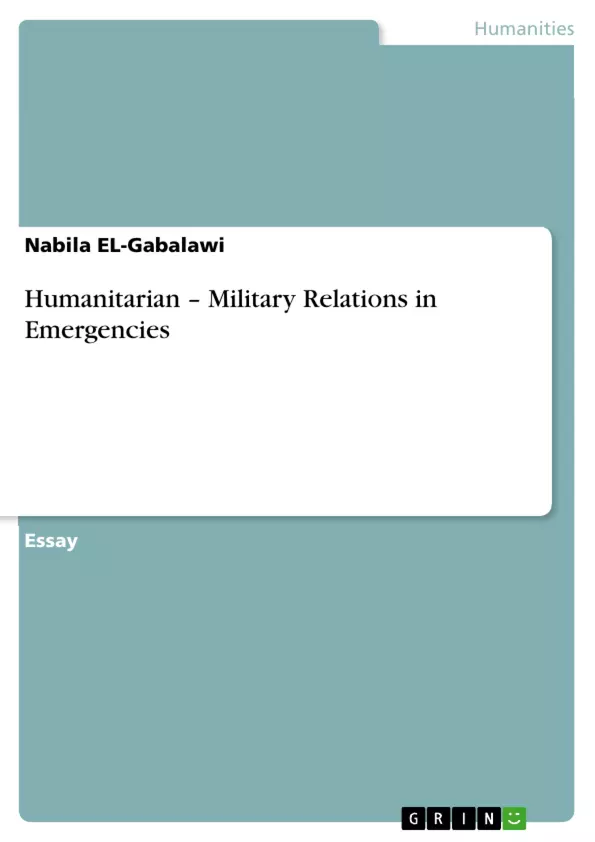This paper criticises the involvement of military forces side by side with the humanitarian NGOs in humanitarian assistance situations. The mutual interest of both of them for working in the same field necessitates the cooperation between the relief NGOs and military forces for the purpose of coordination in delivering aid and ensuring the security of the latter. Discussed within are the benefits of involving the military forces into humanitarian aid and the main threats that arise from their involvement. The paper also analyses the military practises that destabilise the humanitarian principles by highlighting examples from situations happened in conflicts and complex emergencies. Suggestions for making the military involvement- if it is a must - to be more humanitarian are also illustrated in the paper.
Inhaltsverzeichnis (Table of Contents)
- Introduction
- Discussion
- The increased involvement of military in humanitarian aid
- Seeking safety and security for humanitarian staff and operations
- The added values and the main concerns of engaging military assets and personnel in humanitarian response
Zielsetzung und Themenschwerpunkte (Objectives and Key Themes)
This paper critically examines the involvement of military forces alongside humanitarian NGOs in humanitarian assistance situations. It explores the benefits and drawbacks of this collaboration, with a focus on how military practices might undermine humanitarian principles. The paper also provides suggestions for minimizing risks associated with military involvement in humanitarian responses.
- The complex relationship between military and humanitarian actors in emergency situations
- The changing roles of military forces in post-Cold War conflicts
- The challenges of ensuring humanitarian principles in the context of military intervention
- The benefits and risks of military involvement in delivering humanitarian aid
- Strategies for minimizing risks and maximizing the positive impacts of military involvement in humanitarian responses
Zusammenfassung der Kapitel (Chapter Summaries)
- Introduction: This section sets the stage for the paper by highlighting the potential tensions between humanitarian organizations and military forces operating in the same areas. It emphasizes the need for cooperation and coordination while acknowledging the differing mandates and principles of these actors.
- Discussion: This section delves into the historical context of increased military involvement in humanitarian aid, tracing the evolution of this relationship from the post-Cold War era onwards. It highlights the growing complexity of emergencies and the need for integrated approaches involving both military and humanitarian actors.
- The increased involvement of military in humanitarian aid: This section explores the factors contributing to the growing military role in humanitarian aid, including the changing nature of conflict, the increased intervention of the international community, and the demands of complex emergencies.
- Seeking safety and security for humanitarian staff and operations: This section examines the need for security in humanitarian operations, particularly in the face of violence and threats against aid workers. It highlights the increasing reliance on military forces for protection and logistical support, while acknowledging the potential risks associated with such cooperation.
- The added values and the main concerns of engaging military assets and personnel in humanitarian response: This section analyzes the benefits and concerns associated with engaging military personnel and assets in humanitarian responses. It discusses the added value of military skills and resources while highlighting the potential for military interventions to undermine humanitarian principles.
Schlüsselwörter (Keywords)
The primary keywords and focus topics of this text include humanitarian aid, military intervention, security, humanitarian principles, complex emergencies, post-Cold War conflict, aid agencies, NGOs, and the relationship between military and civilian actors in emergency situations.
Frequently Asked Questions
Should military forces be involved in humanitarian aid?
The paper criticizes this involvement, arguing it can destabilize humanitarian principles like neutrality and independence.
What are the benefits of military-NGO cooperation?
Key benefits include enhanced security for aid workers and logistical support in complex emergency environments.
How does military involvement threaten humanitarian principles?
Military presence can blur the lines between aid and political/military objectives, potentially making aid workers targets in conflicts.
What changed in humanitarian aid after the Cold War?
The nature of conflict evolved, leading to more complex emergencies where international intervention often includes both military and civilian actors.
How can military involvement be made more humanitarian?
The paper suggests strategies to minimize risks and ensure that military assets are used strictly to support humanitarian goals when necessary.
- Quote paper
- Nabila EL-Gabalawi (Author), 2008, Humanitarian – Military Relations in Emergencies, Munich, GRIN Verlag, https://www.grin.com/document/293523



